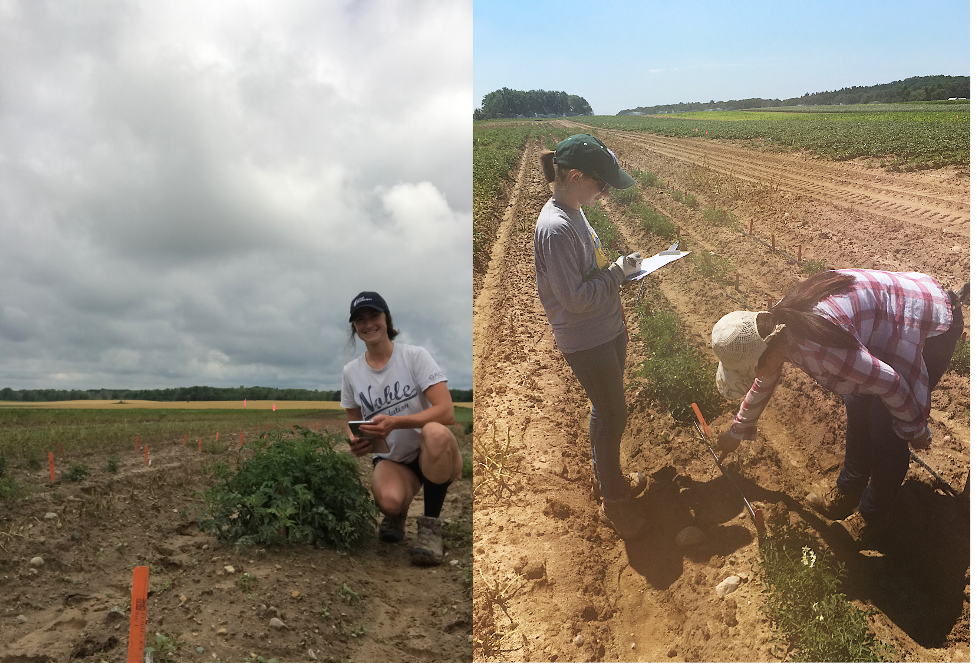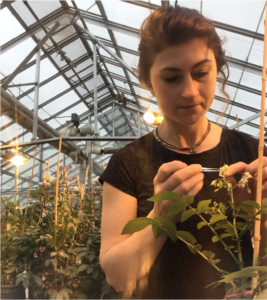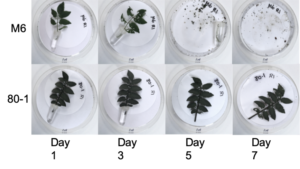
New tools, approaches may yield Colorado potato beetle-resistant varieties
The Colorado potato beetle is a major pest in North America that can reduce potato yields by 30-50% if unchecked. Control has historically relied heavily upon the use of pesticides, but failure of chemical control against Colorado potato beetle has been reported for most major classes of synthetic insecticides.
Since the 1980s, we have known that Solanum chacoense, a wild species from Argentina, was highly resistant to Colorado potato beetle. U.S. and Canadian breeders have attempted to breed beetle resistant varieties, but it has been difficult to transfer the strong resistance we see in wild relatives into commercial varieties.
Michigan State University has followed in the footsteps of the previous potato researchers and has been working on this challenge using research tools optimized in potato for more than a decade, such as genomics and gene editing. Combining these tools with a new breeding strategy that simplifies potato breeding has allowed us to make advances that put beetle resistant varieties within grasp.
Wild potato relatives naturally make their own insecticidal compounds to keep pests like the Colorado potato beetle at bay. Different wild species produce unique versions of these compounds known as glycoalkaloids. Some are so effective they cause mortality in Colorado potato beetle larvae and dramatically reduce adult beetle feeding.

Glycoalkaloid production in potato leaves is advantageous for warding off hungry beetles, but consuming large amounts of glycoalkaloids can cause adverse health effects in humans. For this reason, Professor David Douches and graduate student Natalie Kaiser at Michigan State University are working to create potato varieties that synthesize a powerful glycoalkaloid called leptine only in the leaves of the potato.
By comparing the chemical profile of hundreds of individual potatoes with their resistance to the Colorado potato beetle in the field, Kaiser also found chemical signatures that could predict field performance. This means that breeders can select resistant potatoes with a simple chemical measurement instead of having to conduct a field trial.
Researchers have tried to introduce production of potent leptine glycoalkaloids to potato cultivars before and run into several obstacles. For starters, there are a great number of genes controlling the types and amounts of glycoalkaloids that any given potato variety will produce. Getting the exact combination of genes is crucial. To better track all the genetic players, the Douches lab sequenced the whole genome of these wild potatoes that are resistant to the Colorado potato beetle and ones that are susceptible to the pest. Kaiser then identified key changes at the DNA level between the potatoes that explained the differences in their chemical profile and Colorado potato beetle likability.

Now that we know the suite of genes required to make a potato plant resistant, the next challenge is to transfer all the genes into a potato cultivar with other good characteristics, such as high yield and desirable tuber appearance, by cross pollinating. This process is complicated by the fact that potato cultivars have four copies of every gene. To make matters more complex, each of the four copies can be a different version of the gene. It is difficult to make sure that all four copies of the genes we are interested in are the desirable copy necessary for resistance.
One strategy to overcome this issue is to work with potatoes that naturally only have two copies of every gene, which are known as diploid potatoes. Many wild potato relatives, including the Colorado potato beetle resistant types that produce leptines, are diploids. Through self-pollination, Kaiser has been able to develop inbred diploid lines with strong resistance to Colorado potato beetle. These diploid inbred lines simplify the breeding process because the traits breed true, like the two parents in a corn hybrid. We can more easily track how genes impacting beetle resistance are inherited because we know the copy of each gene they will pass along to their offspring.
Excitingly, these are the first inbred lines selected for a specific resistance trait in potato! We have crossed these lines to our best breeding lines. In 2021, the MSU team will screen offspring of these crosses in the field and will look to identify individuals that have good tuber characteristics combined with the beetle resistance. Working with inbred lines, we can also begin to stack beetle resistance with other traits, such as disease resistance.
Furthermore, in this simpler genetic system, the Douches lab is using modern genetic tools like genome editing. Kaiser is using genome editing to selectively turn off genes, either one at a time or in combination, to determine if they are necessary for plant protection. It is important to note that this method is turning off genes that are naturally in the potato and no foreign genes are introduced.
Because the Colorado potato beetle is known for rapidly overcoming even the most noxious pesticides, Douches recommends that this host plant resistance be implemented in an IPM scheme to extend the life of this valuable tool.
— Dave Douches, Ph.D., is a professor in Michigan State University’s Department of Plant, Soil and Microbial Sciences. He has led the MSU potato breeding and genetics program for more than 30 years. Natalie Kaiser is a Ph.D. candidate in MSU’s Department of Plant, Soil and Microbial Sciences studying potato breeding and genetics.
Top photo: Graduate student Natalie Kaiser next to the beetle resistant wild potato relative 80-1 that remains untouched in the field (left). Researchers Kate Shaw and Chen Zhang (right) rate Colorado potato beetle defoliation in a field trial.














